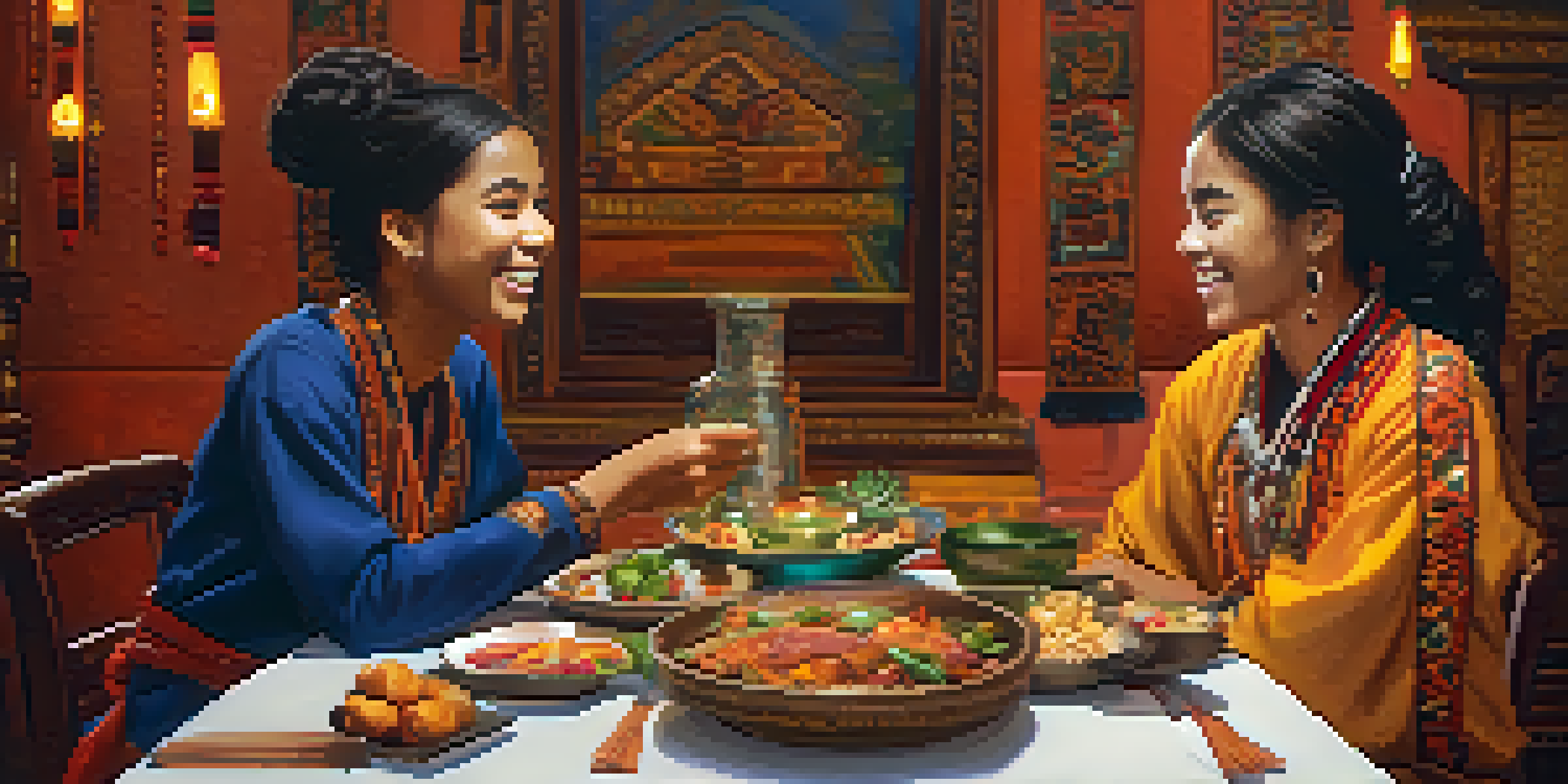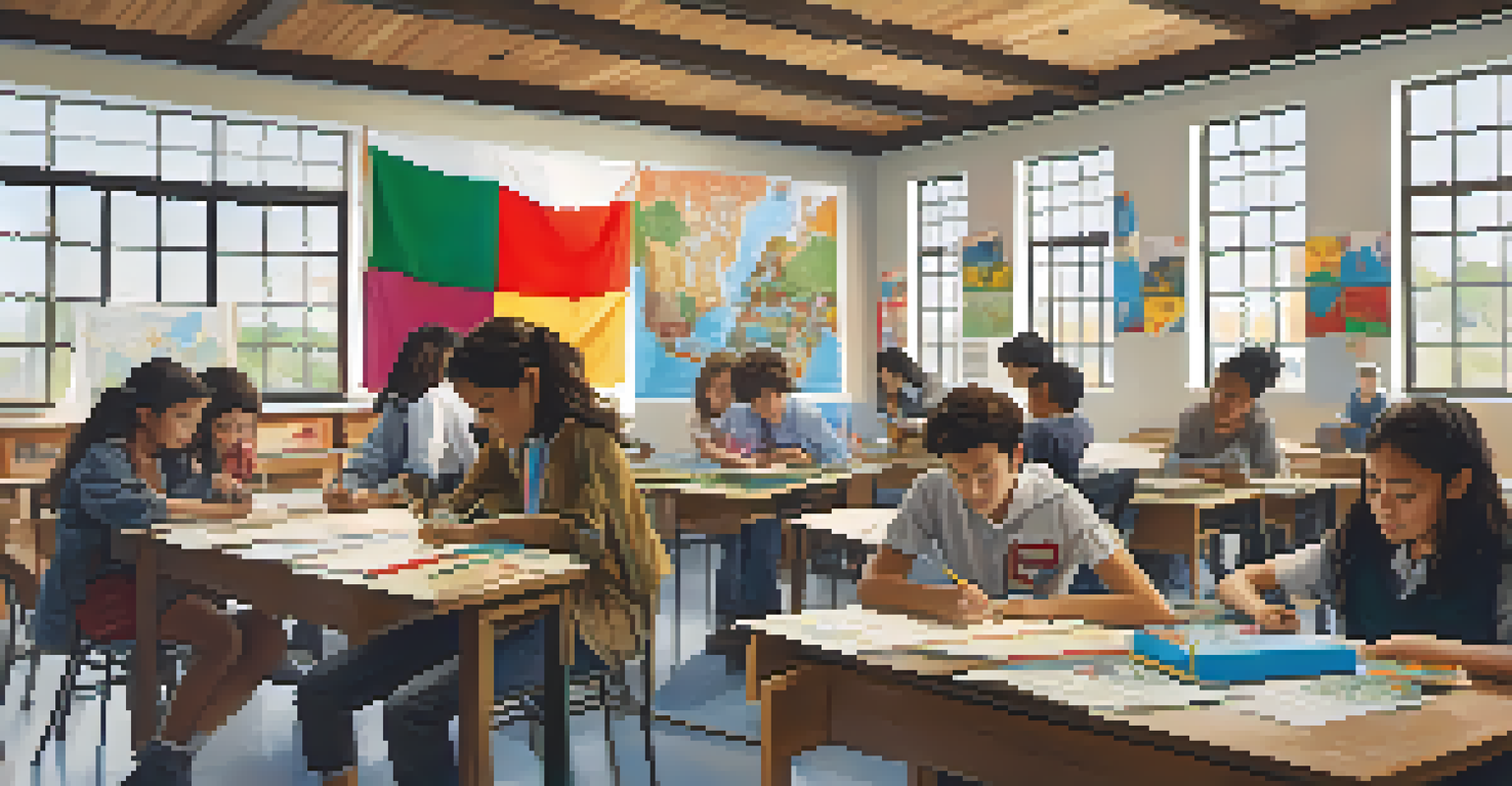How Cultural Exchange Programs Foster Global Understanding

Understanding Cultural Exchange Programs
Cultural exchange programs are initiatives that allow individuals to immerse themselves in different cultures. They often involve travel, education, and community service, fostering direct interactions between people from various backgrounds. By participating in these programs, individuals gain firsthand experience of different customs, traditions, and languages, which can be eye-opening.
The world is a book, and those who do not travel read only one page.
Imagine swapping homes for a month with someone from another country. You’d not only learn about their way of life but also share your own experiences, creating a rich tapestry of understanding. These exchanges often lead to lifelong friendships and networks that span the globe, breaking down barriers and stereotypes.
Ultimately, cultural exchange programs serve as a bridge, connecting people through shared experiences and mutual respect. They provide a platform for dialogue, allowing participants to discuss their differences and similarities, highlighting the beauty of diversity.
Promoting Empathy Through Shared Experiences
One of the key benefits of cultural exchange programs is the promotion of empathy among participants. When individuals step into someone else's shoes—quite literally—they begin to see the world from a different perspective. This shift in viewpoint can foster a deep understanding of the challenges and triumphs faced by others.

For instance, a student from the United States might spend time in Japan, learning about the culture while also sharing aspects of their own. This exchange creates a space where both parties can express their thoughts and feelings, leading to greater emotional intelligence and compassion. It's like sharing a meal; the act of eating together can break down walls and create bonds.
Cultural Exchange Fosters Empathy
Participants gain a deeper understanding of diverse perspectives, leading to greater emotional intelligence and compassion.
As empathy grows, so does the potential for global cooperation. Participants are more likely to advocate for issues affecting others, leading to a more interconnected world where understanding prevails over conflict.
Breaking Down Stereotypes and Misconceptions
Cultural exchanges play a crucial role in dismantling stereotypes and misconceptions. Often, our understanding of other cultures is shaped by media portrayals, which can be misleading or overly simplistic. By engaging with individuals from diverse backgrounds, participants can challenge these preconceived notions and gain a more nuanced view of the world.
We do not inherit the earth from our ancestors; we borrow it from our children.
Take, for example, a participant from a Western country who visits a Middle Eastern nation. Through direct interaction, they may discover that the culture is rich and varied, contrary to the one-dimensional images often depicted in the media. Such experiences can profoundly change perspectives and encourage more balanced conversations about cultural identity.
This process of breaking down stereotypes not only benefits the individuals involved but also contributes to a broader societal understanding. As more people share their experiences, the collective narrative becomes more inclusive and representative of the true diversity of our world.
Enhancing Language Skills and Communication
Language barriers can often hinder understanding between cultures, but cultural exchange programs provide an ideal environment to bridge these gaps. Participants are often immersed in the language of their host country, leading to rapid language acquisition and improved communication skills. This immersion is like diving into a pool; the best way to learn to swim is to get in and practice.
As participants navigate daily interactions, they not only learn new vocabulary but also pick up on colloquialisms and cultural nuances. This is crucial for effective communication, as language is deeply intertwined with cultural context. By understanding how to express themselves in another language, participants can engage more deeply with their hosts.
Bridging Language Barriers
Immersion in different cultures enhances language skills and communication, allowing for more meaningful interactions.
Moreover, enhanced language skills can lead to greater confidence in cross-cultural interactions long after the program ends. Participants often return home with a newfound ability to engage with diverse communities, promoting further cultural exchange in their own environments.
Building Lasting Relationships and Networks
One of the most rewarding aspects of cultural exchange programs is the relationships that are formed. Participants often leave with friendships that transcend borders, creating a global network of support and understanding. These connections can lead to future collaborations, travel opportunities, and even career paths.
Consider the story of two students who met during a cultural exchange. They bonded over shared interests and decided to collaborate on a project that combined their cultural perspectives. This partnership not only enriched their personal lives but also contributed meaningful insights to their respective communities.
These lasting relationships highlight the power of personal connections in fostering global understanding. As participants stay in touch, they continue to share experiences and insights, creating a ripple effect of cultural awareness and appreciation.
Contributing to Global Citizenship and Responsibility
Cultural exchange programs cultivate a sense of global citizenship among participants. By experiencing different cultures and perspectives, individuals begin to see themselves as part of a larger global community. This awareness encourages them to advocate for social justice, environmental sustainability, and other global issues.
For instance, a participant who learns about sustainable practices in another country may be inspired to implement similar initiatives back home. This transfer of knowledge empowers individuals to take action, fostering a sense of responsibility toward the global community.
Building Global Networks
Cultural exchanges create lasting friendships and professional connections that contribute to a more interconnected world.
As participants become more engaged global citizens, they inspire others to join in the effort. This collective action can lead to significant positive change, illustrating how cultural exchanges can ripple outwards to impact society as a whole.
The Role of Educational Institutions in Cultural Exchanges
Educational institutions play a pivotal role in facilitating cultural exchange programs. Many schools and universities offer structured programs that connect students with opportunities to study abroad or host international peers. This not only enriches the educational experience but also prepares students for a globalized workforce.
For example, a university might partner with an institution in another country to create a joint degree program. Students from both institutions benefit from shared resources and diverse perspectives, enhancing their academic journey. It's like adding vibrant colors to a canvas; each culture brings its unique hue to the educational experience.

Moreover, these institutions often provide support systems to help participants navigate their experiences, ensuring a smoother transition. This guidance is crucial in maximizing the benefits of cultural exchange, enabling students to make the most of their time abroad.
The Future of Cultural Exchange Programs
As the world becomes more interconnected, the importance of cultural exchange programs continues to grow. New technologies and communication methods are enhancing these programs, making them more accessible than ever. Virtual exchanges, for instance, allow individuals to connect and share experiences without the need for travel.
However, while technology can facilitate connections, the value of in-person experiences remains unparalleled. The richness of face-to-face interactions, shared meals, and cultural festivals cannot be replicated online. As we look to the future, finding a balance between virtual and physical exchanges will be key to fostering understanding.
Ultimately, cultural exchange programs will continue to evolve, adapting to the needs of a changing world. By prioritizing these initiatives, we can foster greater global understanding and cooperation, creating a brighter future for all.